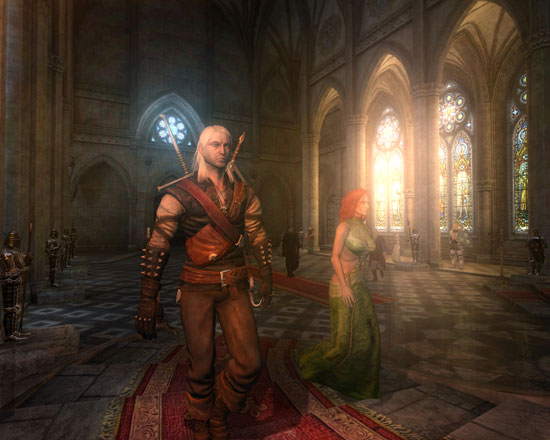The final game I was shown while meeting with Atari turned out to be a wonderfully pleasant surprise to round off my afternoon. Polish publishing company CD Projekt’s upcoming fantasy RPG for the PC, The Witcher, attempts to redefine the generic RPG into a complexly involved gaming experience unlike any RPG before it. The narrative, a continuation to a series of popular Polish fantasy novels by author Andrzej Sapkowski, places you in the shoes of a mutant assassin named Geralt and follows his journey of morality choices to unfold a fully unique experience each time you play.
To see what this beautiful gem of a game is all about, and to observe the first time I’ve virtually drooled all over an RPG since I first discovered the Final Fantasy series, hit the jump.
It seems as though the anti-hero has taken a firm stand in modern video games as demigods slay the big-time gods while other folks summon the darkness to get revenge on mob members. Geralt would qualify as one of these characters; a mutant human with supernatural powers and an assassin by trade who stands on the edge of what is good and what is evil throughout his journey.
In Geralt’s fantastical world, humans, elves, and dwarves pit racism against each other forcing Geralt to decide whom he must support and whom he distrusts. Because of The Witcher‘s unique narrative, players encounter choices who’s consequences can only be detected hours later in the game. This prevents any hypothetical indecisive wimps who would save before a choice is made in hopes of having full control of the story. When a significant moment in your path is a clear result of an earlier decision, a short illustrated cut-scene reminds you of your past actions, giving relevance to the present. All in all, this gives the game remarkable re-playability with a total of three entirely different endings to anticipate.
Not only will you put more thought into your game in regards to the story, but The Witcher‘s unique battle system allows the player to become more conscious of their fighting technique. Utilizing two different swords, a steel sword most effective on humans and a silver sword specialized for monsters, players must choose which weapon best suits the battle situation while additionally switching between strong, fast, and group fighting styles. Furthermore, because of Geralt’s mutant make-up, typical potions cure him while simultaneously depositing poisonous toxins in his body which in the long run will cause damage. This prevents players from going potion crazy to cure themselves and alternatively forces them to plan how they intend to care for Geralt in the long run. That’s right folks, you have to be responsible for the guy. Geralt refuses to be disposable and really despises the after burn of phoenix downs.
The lush and beautifully rendered graphics create a uniquely tense environment that is significantly more grim than the typical fantasy landscape and refreshing at that. With a modern dialogue that doesn’t attempt to be Shakespearian and social mini games such as pub drinking to manipulate your allies, The Witcher looks to be a fresh take on the typical RPG and by far one of the more interesting games that I got a chance to see at E3.


